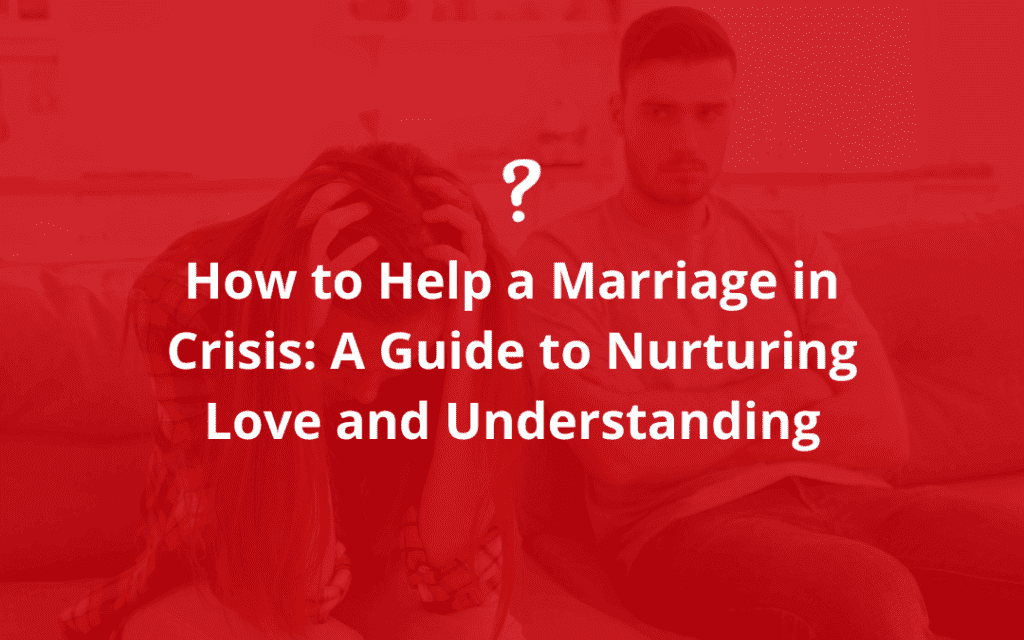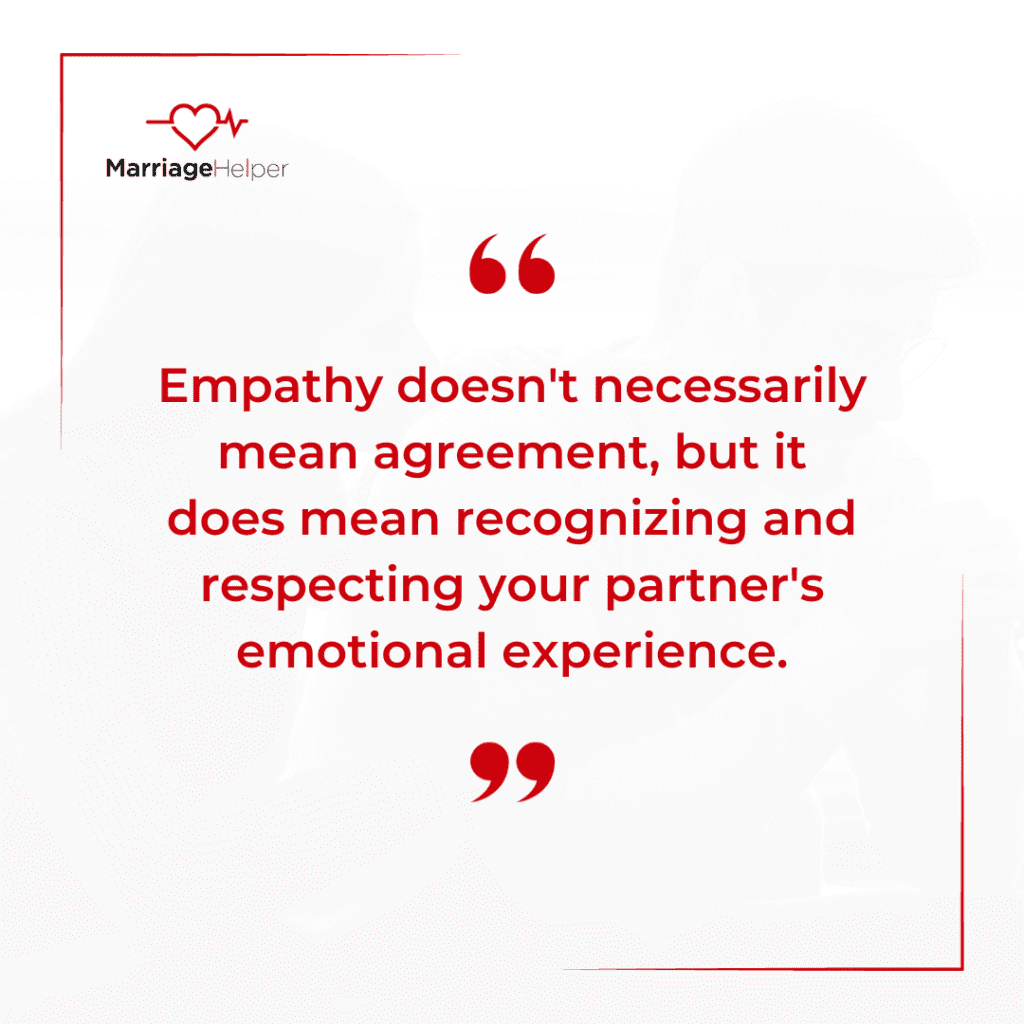
Facing a problem in your marriage can feel like navigating a ship through a storm.
It’s a time filled with uncertainty, emotional turbulence, and the fear of losing what you’ve built together.
Imagine a scenario where one spouse has been so caught up in their career that they’ve unintentionally neglected their spouse, leading to feelings of loneliness and abandonment in their spouse.
Or another situation where one spouse has become a little too close to someone of the opposite sex, resulting in the emotions of jealousy and betrayal.
Although these scenarios happen all the time, they can escalate into a serious marital crisis if not addressed with care and mutual respect.
If you’re searching for ways to help a marriage in crisis, know that you’re not alone in this.
The path ahead might seem daunting. But with the right approach, you can steer your relationship back to calmer waters.
It’s about taking that first step towards understanding and healing, together.
Get the help your marriage needs today – explore our workshops and resources to save your relationship.
How to Help a Marriage in Crisis
Trying to fix a marriage in crisis can be daunting, especially if you want to win back your spouse and rebuild an already fragile relationship.
While there’s no magic potion to instantly save your marriage, here are 5 ways to help you get started.
1. Empathize with Each Other’s Feelings
To empathize effectively, you need to listen actively and attentively.
It’s about being fully present in the conversation and making a conscious effort to understand your spouse’s feelings.
Empathy also requires openness and vulnerability.
Sharing your own feelings in an honest and non-confrontational way can encourage your spouse to do the same.
This reciprocity creates a safe space where both spouses can feel heard and valued.
However, empathy is not always easy, especially in times of personal distress or intense emotions.
It might be challenging to understand your spouse when you are feeling hurt or misunderstood yourself.
Yet, it is in these challenging times that empathy becomes most vital. It has the power to break down walls of resentment and pave the way for genuine connection and healing.

2. Spend More Quality Time Together
In our busy lives, it’s easy for couples to drift apart.
The reason isn’t always that your spouse no longer loves you. Often, it’s because you don’t spend as much time together as you used to.
Putting more effort into quality time with your spouse is a powerful antidote to feelings of loneliness.
For example, you can schedule regular date nights to dedicate time exclusively to each other.
These dates don’t have to be extravagant. It could be as simple as a quiet dinner at home, a walk in the park, or exploring a new hobby together.
What matters is that you are both present and engaged with each other.
Quality time also includes those small, mundane moments that offer opportunities for connection and teamwork.
For instance, making a meal together, enjoying a quiet coffee in the morning, or even doing household chores.
3. Encourage Regular and Intentional Conversations
Setting aside time for regular and meaningful conversations is crucial in reigniting trust and intimacy in your marriage.
Start by discussing the simple things – how your day went, what you encountered, and how it made you feel.
These daily check-ins create a routine of sharing each other’s lives and reinforce the partnership in your marriage.
But don’t stop at the surface level.
Share your dreams, aspirations, and even your fears. Talk about the things that move you, inspire you, and worry you.
This kind of sharing invites your spouse into your inner world.
It’s an opportunity to know and be known on a deeper level, beyond the daily routines.
4. Seek Guidance from Professionals

Before you ask for help, it’s important to calm down and gain clarity on the specific issues you want to resolve.
This reflection can help you articulate your concerns more effectively during counseling.
It will also stop you from doing anything that can further harm your relationship with your spouse, like impulsively sending an emotionally loaded text or begging them to work on your problems.
Marriage coaches are trained to uncover underlying problems, facilitate effective communication, and help couples develop strategies for healing and growth.
They offer a perspective that is both informed and neutral.
Organizations like Marriage Helper use a research-based approach to addressing marital challenges.
Our methods focus on comprehensive, empathetic guidance with structured steps to rebuild and strengthen a marriage.
In seeking professional help, you can access the right tools and support to find your way back to a healthy, fulfilling relationship.
5. Move Forward with Patience and Forgiveness
Healing and forgiveness don’t happen overnight.
It takes time before you can stabilize a marriage in crisis.
During the process, remember that every positive step, no matter how small, makes a difference.
You just need to be patient with yourself and your spouse to forgive.
Aim to pull your spouse in rather than push them away.

These actions might include thoughtful gestures, words of appreciation, or simply offering a listening ear.
But it’s equally about the things you don’t do.
For instance, don’t be aggressive and confrontational. This will only drive away your spouse instead of encouraging them to come to you.
Forgiveness, in harmony with this positive ‘pull,’ fosters an environment where love can re-grow.
What are The Signs of an Unhappy Marriage?
The signs of an unhappy marriage include emotional disconnection, breakdown of communication, and sudden changes in a spouse’s lifestyle or worldview.
If you’re experiencing any of these with your spouse, don’t panic.
There’s always something you can try before giving up on your marriage.
You just need to look at the signs and figure out the next best move.
Emotional Disconnect
Emotional disconnection is more than just going through a “rough patch.”
It’s a profound sense of drifting apart where the deep bond you once cherished with your spouse seems to be fading away.
This feeling can manifest itself in several ways:
Lack of empathy
One or both spouses no longer show the same level of concern or understanding for each other’s feelings and experiences. It might feel like living with a stranger rather than with someone who deeply understands you.
Absence of emotional support
During times of stress or hardship, you or your spouse may feel increasingly alone, unable to lean on each other for comfort or reassurance. This isolation within the relationship can lead to a sense of loneliness even when you’re physically together.
Breakdown of physical intimacy
Affectionate gestures, touch, and sexual intimacy might decrease or feel like a chore. You and your spouse may lack the warmth and attachment that marked the earlier stages of your relationship.
Communication Breakdown
Where once you might have shared stories about your day, your dreams, or your worries, there is now an unspoken void.
Conversations become purely transactional, focusing only on day-to-day necessities like schedules or household chores.
As this pattern continues, misunderstandings can take root and grow.
These aren’t just simple miscommunications that can be easily resolved.
They indicate a deeper issue where both spouses may feel misunderstood, unheard, or even disregarded.
In some cases, this breakdown leads to the avoidance of communication altogether.
The fear of arguments or the belief that it won’t make a difference leads to a retreat into silence.

When words fail and understanding fades, the very essence of your connection is at stake.
Changes in Lifestyle and Worldview
While change is a natural part of life, it becomes a problem when it leads to a growing chasm between spouses.
The issue isn’t the change itself, but how it’s managed within the context of the relationship.
If these changes lead to spouses feeling like they are living parallel but separate lives, it affects the core unity of your marriage.
Changes in career paths are a common example.
One spouse may start a new job that demands more time and energy. Perhaps the job offers a different level of financial stability that can alter the couple’s dynamics.
This shift can lead to adjustments in roles and expectations within the marriage.
Sometimes, it can cause stress or resentment if not approached thoughtfully.
Take the Next Step to Help Your Marriage
Choosing to heal and strengthen your marriage takes courage.
At Marriage Helper, we are dedicated to supporting you every step of the way.
Our workshops offer focused and transformative guidance for you and your spouse – even if you’re separated or your spouse wants out.
For ongoing support, you can join our online membership. It’s a platform with an interactive community and educational resources, all aimed at nurturing and sustaining a healthy, loving relationship.
Join us today, and take the first step to saving your marriage.




